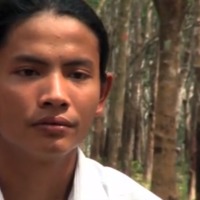
I had wanted to go to Thailand for a long time. After having problems with my friend my parents sent me to Thailand. When I arrived in Thailand from Myanmar I started working on a rubber plantation.
[One day while he was sleeping armed strangers entered his home and forced him into a van]
I saw that a girl and two boys were already in the car. The girl and the two boys were blindfolded. As soon as I was put into the car, they blindfolded me. I didn’t know where they were going, but I knew what they were going to do to me.
I had heard stories of humans being sold. That’s how I knew I was going to be sold.
They took off my blindfold and untied my hands. I was being held by a huge Thai guy on my left and a thin Thai guy on my right. They forced me onto the fishing boat.
That evening, the net master came to see me. He said, “You’re going to work for me, you’ve been sold to us.” He explained to me, “If you work for 6 months, you’d be able to pay back your debt. After that you are free to go wherever you want.” He said, “You’ve been sold. Escaping is impossible.”
While at sea, we started working at 6am pulling the nets out of the waters. Each time took four hours. We had to do this six times per day. Sometimes we had to work for 24 hours straight, without even a single hour of sleep.
The most dangerous work was fixing the fishing nets while the boat was moving. In order to fix the net, we had to stand on a very small outer-rim that’s about four fingers wide. That was the most dangerous time for us. If you fell into the water, your entire body would be chopped up by the propellers of the boat. Sometimes we weren’t allowed to sleep for two or three days.
When our boat docked, a lot of Myanmar and Cambodian fishermen were fighting each other. The captain, the second captain, the net master and the engine mechanic, they were all focused on the fight.
I got a chance to escape, I went to the harbour, I borrowed some Thai baht from a Myanmar man to take a motorbike to Hat Yai, where my elder brother was working on a rubber plantation.
I met my elder brother, my uncles, my family and my friends. I was very happy. I got the freedom that human beings deserve.
If you go to foreign countries for work, you should be aware and careful so you can avoid the situation that happened to me. Always remember the phone number of someone who can help you.
As told to documentary makers at MTV Exit.









